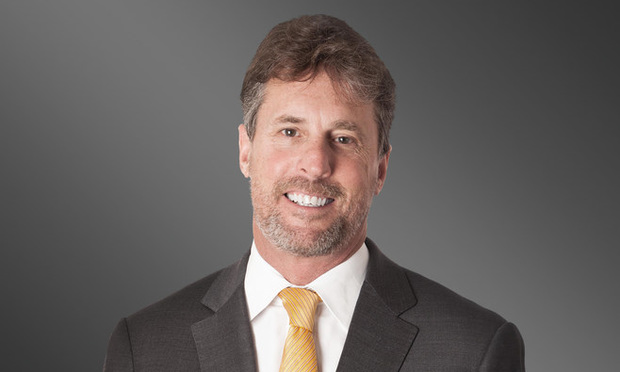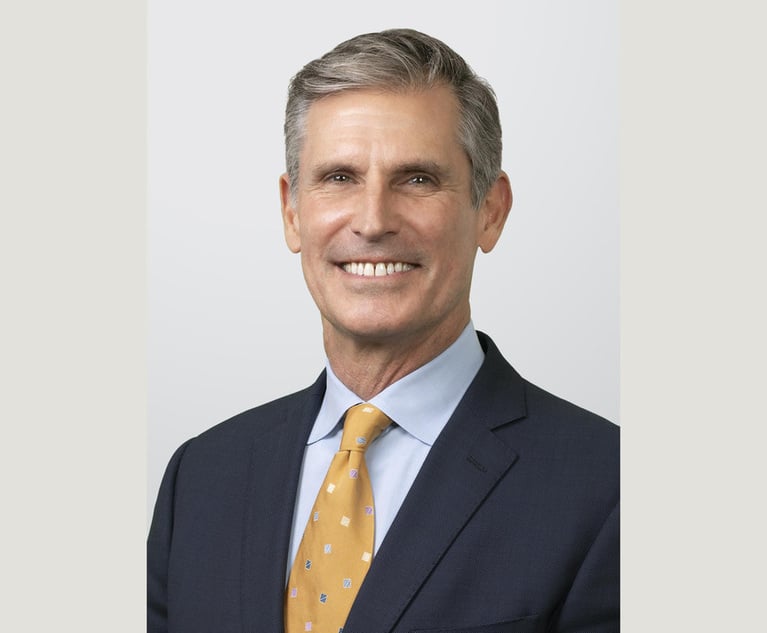Greenberg Traurig's Brad Kaufman Measures His Success by the Success of Others
The firm's new co-president has developed a world-class practice. But he considers the legal success of those he's mentored as important as his personal legal victories.
May 17, 2019 at 03:43 PM
6 minute read
 Bradford Kaufman, of Greenberg Traurig.
Bradford Kaufman, of Greenberg Traurig.
Greenberg Traurig partner Brad Kaufman, who assumed the role of co-president of the Am Law 100 firm in January, says the biggest challenge facing the legal industry stems from the associate pipeline.
Lateral associate hiring is in vogue, these days, he says. So then where does that leave law school graduates?
“It's unsustainable,” he said. “Where are these kids getting their feet wet?”
And what if there's a recession? Kaufman worries the legal education industry is test-obsessed, that schools are sacrificing externships and clinics for fear that their bar passage rates are slipping.
A longtime securities lawyer, Kaufman is not the kind of attorney who would normally be expected to focus on associates and legal training. He has argued before the Supreme Court with Ken Starr and brushed shoulders with Wall Street executives. He flits around the world to serve his clients. Nowadays, he often finds himself in England representing Barclays executive Roger Jenkins, who is facing fraud charges that stem from the 2008 financial crisis.
But Kaufman does make associates one of his biggest concerns. And he always has. The legal world is replete with Kaufman proteges: Greenberg partner Tracy Gerber, Morgan Stanley general counsel Anne Tennant and Greenberg litigation chair Joe Coates. His paralegal just retired after working for him for 26 years. His two assistants have been with him for over 25 years.
To be sure, Kaufman is highly respected for his professional successes. But he may be more beloved for his role as a mentor and for his loyalty to the people around him.
Born in Naples, Kaufman was the first in his family to go to college and went to law school at Stetson University after getting his undergraduate degree from Florida State University. He studied at Oxford University for a semester then landed his first job at Florida-based Gunster.
In 1989, he moved to Steel Hector & Davis. For the first time, Kaufman had a team. It was then that he started playing the role of mentor. Tennant, now Morgan Stanley's GC, was his first hire — made when he was a senior associate. She worked for him for six years, leaving to join Morgan Stanley, their biggest client, in 1999.
Her move was both “a great fortune and great misfortune,” he said with a wry smile.
“She's unbelievably brilliant. Just such a pleasure to work with,” he said. “People always say 'Wow, that must be great for you, Brad.' But the reality is I wish Anne had never left.”
Kaufman made partner in 1991 and moved to Greenberg in 2000. It was there that his career took off. In 2002, Kaufman hired Gerber, who was coming off a hiatus after having two children. She worked a reduced schedule, about 500 hours, and took some time off later to have her third child.
To Gerber, that flexibility meant the world. When she came back after her leave, she took on a full workload. She was having so much fun trying cases, she said, and Kaufman heaped support on her. It was then she decided she wanted to make partner.
“He really encouraged me to move my career forward and try bigger cases,” Gerber said. “He gave me those opportunities by putting me in front of clients and bringing me in meetings. When he had the opportunity to try a big case, he would put me out there for opening and closing. At some point, he basically made himself second chair.”
It was because of Kaufman, she said, that she was able to expand her own practice.
Even today, as Gerber continues to develop her own broker/dealer practice, she still reaches out to Kaufman as a sounding board. And she has also tried to focus on associates, using Kaufman as a role model. Greenberg partner Elizabeth Moum was the first associate she hired over a decade ago.
“Having a practice that's bigger than yourself, working to build something great so that others can participate in that, too, is sort of the way I look at what Brad has done,” she said.
As newly anointed co-president, Kaufman is still trying to figure out his workload. In addition to his international practice, Kaufman has led Greenberg's associate development program for 12 years.
“I love it,” Kaufman said. “I won't be giving up those responsibilities anytime soon.”
Kaufman said he took charge to lead the associate development program because he believes that building a great team is essential to success, and the team begins with strong associates. He was already an advocate for associates informally, so it made sense to appoint him to the role.
As a liaison to the associates, Kaufman takes issue with how older attorneys talk about millennials and the generation gap. He's had attorneys come up to him and tell him, “How can you work with millennials all day; they're so entitled. Doesn't that get annoying?” Kaufman immediately pushes back.
“It's all nonsense,” he said. “Generational differences will always exist because generations grow up in different times. It isn't a reason to divide us. All of the negatives associated with the Millennial generation is just hype.”
Baby boomers grew up protesting the Vietnam War, he said. They were told to “Turn on, tune in, drop out,” to use a popular phrase. Kaufman believes that as millennials grow up and have aging parents to care for and children to watch over, their worldview will change.
“I was an associate once, too. There are the same complaints about this generation,” he said. “The nature of being an associate in a law firm, the lack of control … is always going to be the same. But they are going to take over, and the baby boomers will just have to get used to it. Mark my words, you're going to interview a millennial 30 years down the road, and they'll be saying the same thing us boomers say about them now.”
Bradford Kaufman
Born: 1960
Spouse: Jill
Children: Alexis, Brooke and Daniel
Education: Stetson University College of Law, J.D., 1986; Florida State University, B.S., 1982
Experience: Co-president, Greenberg Traurig, 2017-present; Partner, Steel Hector & Davis, 1992-2000; Associate, Steel Hector & Davis, 1989-1991; Associate, Gunster, 1986-1989
This content has been archived. It is available through our partners, LexisNexis® and Bloomberg Law.
To view this content, please continue to their sites.
Not a Lexis Subscriber?
Subscribe Now
Not a Bloomberg Law Subscriber?
Subscribe Now
NOT FOR REPRINT
© 2025 ALM Global, LLC, All Rights Reserved. Request academic re-use from www.copyright.com. All other uses, submit a request to [email protected]. For more information visit Asset & Logo Licensing.
You Might Like
View All
'None of Us Like It': How Expedited Summer Associate Recruiting Affects Law Students and the Firms Hiring Them

Conversation Catalyst: Transforming Professional Advancement Through Strategic Dialogue
5 minute read
What Happens When Lateral Partners’ Guaranteed Compensation Ends?

Holland & Knight Expands Corporate Practice in Texas With Former Greenberg Traurig Partner
3 minute readTrending Stories
- 1'Landmark' New York Commission Set to Study Overburdened, Under-Resourced Family Courts
- 2Wave of Commercial Real Estate Refinance Could Drown Property Owners
- 3Redeveloping Real Estate After Natural Disasters: Challenges, Strategies and Opportunities
- 4Calif. Fires Should Serve as a Reminder to Fla.’s Commercial Landlords and Tenants Not to Be Complacent
- 5The Impact of Artificial Intelligence on Commercial Real Estate Transactions
Who Got The Work
J. Brugh Lower of Gibbons has entered an appearance for industrial equipment supplier Devco Corporation in a pending trademark infringement lawsuit. The suit, accusing the defendant of selling knock-off Graco products, was filed Dec. 18 in New Jersey District Court by Rivkin Radler on behalf of Graco Inc. and Graco Minnesota. The case, assigned to U.S. District Judge Zahid N. Quraishi, is 3:24-cv-11294, Graco Inc. et al v. Devco Corporation.
Who Got The Work
Rebecca Maller-Stein and Kent A. Yalowitz of Arnold & Porter Kaye Scholer have entered their appearances for Hanaco Venture Capital and its executives, Lior Prosor and David Frankel, in a pending securities lawsuit. The action, filed on Dec. 24 in New York Southern District Court by Zell, Aron & Co. on behalf of Goldeneye Advisors, accuses the defendants of negligently and fraudulently managing the plaintiff's $1 million investment. The case, assigned to U.S. District Judge Vernon S. Broderick, is 1:24-cv-09918, Goldeneye Advisors, LLC v. Hanaco Venture Capital, Ltd. et al.
Who Got The Work
Attorneys from A&O Shearman has stepped in as defense counsel for Toronto-Dominion Bank and other defendants in a pending securities class action. The suit, filed Dec. 11 in New York Southern District Court by Bleichmar Fonti & Auld, accuses the defendants of concealing the bank's 'pervasive' deficiencies in regards to its compliance with the Bank Secrecy Act and the quality of its anti-money laundering controls. The case, assigned to U.S. District Judge Arun Subramanian, is 1:24-cv-09445, Gonzalez v. The Toronto-Dominion Bank et al.
Who Got The Work
Crown Castle International, a Pennsylvania company providing shared communications infrastructure, has turned to Luke D. Wolf of Gordon Rees Scully Mansukhani to fend off a pending breach-of-contract lawsuit. The court action, filed Nov. 25 in Michigan Eastern District Court by Hooper Hathaway PC on behalf of The Town Residences LLC, accuses Crown Castle of failing to transfer approximately $30,000 in utility payments from T-Mobile in breach of a roof-top lease and assignment agreement. The case, assigned to U.S. District Judge Susan K. Declercq, is 2:24-cv-13131, The Town Residences LLC v. T-Mobile US, Inc. et al.
Who Got The Work
Wilfred P. Coronato and Daniel M. Schwartz of McCarter & English have stepped in as defense counsel to Electrolux Home Products Inc. in a pending product liability lawsuit. The court action, filed Nov. 26 in New York Eastern District Court by Poulos Lopiccolo PC and Nagel Rice LLP on behalf of David Stern, alleges that the defendant's refrigerators’ drawers and shelving repeatedly break and fall apart within months after purchase. The case, assigned to U.S. District Judge Joan M. Azrack, is 2:24-cv-08204, Stern v. Electrolux Home Products, Inc.






